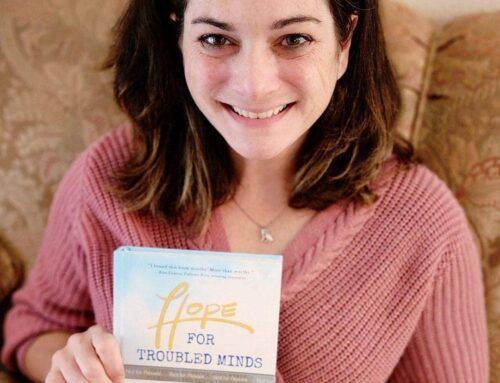This week I received an email which said this:
I am writing to explore your interest in talking with me about living with bipolar disorder. I am supporting the US Department of Health and Human Services’ Substance Abuse and Mental Health Services Administration (SAMHSA) on an educational project related to living successfully with serious mental illnesses. You came to our attention through your blog, Delight in Disorder, and we are inspired by both you and your journey.
We are looking for someone to profile in a short, candid personal video who is living with and managing life with bipolar disorder. The project is part of a national effort to reduce the stigma of mental health disorders, increase hope that living a successful life I is possible, and encourage people to seek help and stay in treatment. The video would be posted on SAMHSA’s website (www.SAMHSA.gov) and promoted through social media and some digital advertising.
I enthusiastically agreed to take part in the project and we set up a conference call for next week. They then sent me a list of questions for response. Here are some:
What would you like people to know about you?
I am a man of firm faith who delights in life and has a way with words.
When did you first notice you were having symptoms?
As a boy, when the imagined cameras I saw filming me shooting baskets on the playground suddenly became very real. In Algebra 2, when the walls were telling me I knew absolutely nothing even though I had the highest score in the class. Finally, as a pastor at 30 when I couldn’t stop laughing at tragedy and sobbing over joyful moments.
Can you describe the process that led to a diagnosis?
I was having religious delusions of being on a mission from God that were both very exhilarating and scary. I sensed if I didn’t get professional help, I could do emotional and spiritual harm to others. A mature Christian couple invited me over to pray. As he stoked a fire, she called on God to show me the next step. That step was checking into a psychiatric hospital. Shortly after I was admitted, I had a manic episode and I was diagnosed with bipolar disorder.
Has your treatment changed over time? If so, how has it changed?
For the first dozen or so years of my treatment, I was prescribed a combination of over 50 psychotropics. None of these “cocktails” had the desired effect of creating balance. I have continually sought outpatient medication management and psychotherapy of various forms and frequency. I have delved into my childhood, done Rorschach tests, kept mood charts, consulted nutritionists, even received Electro-Convulsive Therapy (E.C.T.) I’m happy to say that while I’m not cured, I have been blessed for some time now with a measure of what my doctors call “maintenance remission.” As long as I keep doing what I need to do, it’s not likely I’ll have extreme episodes.
What do you do for yourself to ensure you continue your treatment plan?
First and foremost, I take my prescribed meds. I happen to be one of the fortunate souls among those with mental illness who is not afflicted with anosognosia: biologically-based inability to recognize my illness. I know my brain is sick and I need to take medicine, even though the medicine robs me of some of my most exuberant moments.
Next, I rely on a vibrant spiritual life. Community worship, small faith-based support groups, personal devotions, and compassionate service keep my mind on “things above” my own troubled mind and give me purpose to get out of bed and go about each day.
Finally, I do my best to keep a steady rhythm to work, relax, eat, sleep. This is my most challenging area. My therapist once drew a chart of what a normal person’s schedule looks like and then tore it up and said, “You’re not normal.” He went on to give me permission to be abnormal, within reason.
If someone asked you about bi-polar disorder, what would you tell them?
It is both an inspiring angel and a demon of destruction.
What do you want people to know about treatment?
Educate yourself. Ask questions. Psychiatrists essentially have 15 minutes once a month to review your case and prescribe medications. If you come in and expect them to know exactly what your illness and how to fix it, you will be sorely misguided. Keep mood charts. Track your schedule. Read memoirs of people who have lived successfully with a mental illness. I highly recommend An Unquiet Mind by Kay Redfield Jamison. When I read that, I came to believe that I was not doomed to debilitating disability, but could contribute something back in spite of my disorder, maybe even because of it.
Why is it important to hear your story?
The most important thing about my story is that it is filled with good news. Not so much in the sense of happily-ever-after, but from a faith perspective that there is delight in disorder. In spite of all the shitty things that are inflicted on us from our illness to how people stigmatize us for it, life is worth living and better days lie ahead.
Is there anything else you want to add?
???
What do you think? What would you add?
Discover more from Delight in Disorder
Subscribe to get the latest posts sent to your email.







